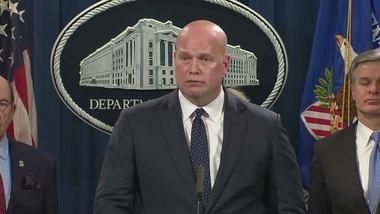Acting AG won’t testify to House committee unless no subpeona

The Justice Department told the House Judiciary Committee on Thursday afternoon that acting Attorney General Matt Whitaker would not appear at Friday's closely-watched oversight hearing unless he receives a written assurance he won't be served with a subpoena.
The threat for Whitaker not to testify comes after the House Judiciary Committee voted earlier Thursday to authorize a subpoena for Whitaker ahead of his Friday testimony — which House Judiciary Chairman Jerry Nadler said he would use only if Whitaker did not appear or would not answer the committee's questions, including about conversations with the White House involving special counsel Robert Mueller's Russia probe.
But the escalating dispute between Nadler and the Justice Department now raises questions about the likelihood of Whitaker appearing in what could be his only congressional testimony while leading the Justice Department, with William Barr on a path to be confirmed as the permanent attorney general by the Senate next week.
In the letter, the Justice Department criticized Nadler for authorizing the subpoena "even though the Committee had not yet asked him a single question" and suggested Democrats were seeking to "transform the hearing into a public spectacle."
"The committee evidently seeks to ask questions about confidential presidential communications that no attorney general could ever be expected to disclose under the circumstances," Assistant Attorney General Stephen Boyd wrote in the letter, obtained by CNN.
The letter outlined a number of questions that Whitaker is prepared to answer and gave Nadler a 6 p.m. Thursday deadline to provide assurances he would not issue a subpoena before or during Friday's hearing.
"The Acting Attorney General will testify that at no time did the White House ask for, or did the Acting Attorney General provide, any promises or commitments concerning the Special Counsel's investigation," Boyd wrote. "With respect to the Special Counsel investigation, the Department has complied with the Special Counsel regulations, and the Acting Attorney General will make clear that there has been no change in how the Department has worked with the Special Counsel's office."
In a statement, Whitaker said he would be willing to testify with the assurance that the committee wouldn't issue a subpoena and would "engage in good faith negotiations before taking such a step down the road."
A senior Justice Department official told CNN that the bottom line is that the Department is not aware of any precedent for the authorization of a subpoena before questioning.
"This is a breach of the agreement," and a "striking departure from long-standing processes."
Democrats approved giving Nadler the authority to subpoena Whitaker over the objection of Republicans earlier on Thursday, passing the resolution on a party-line vote, 23-13.
Nadler said that authorizing a subpoena for Whitaker was necessary because Whitaker failed to tell the committee whether the Trump administration would invoke privilege with respect to a series of questions they intend to ask about Whitaker's conversations with the White House about Mueller's probe and his decision not to recuse himself from the matter.
Nadler argued in a letter sent to Whitaker last month that he could not claim the White House reserved the right to claim executive privilege to avoid answering those questions. He asked Whitaker to consult with the White House ahead of the hearing and tell the committee whether he would invoke privilege.
"The subpoena will only be issued if he refuses to answer questions on a speculative basis of privilege," Nadler said. "If he does not show up — though I do expect he will — but if he refuses to answer questions he ought to answer, then we will have the tools we need to ensure that we may adequately meet our own responsibilities."
Republicans slammed Nadler for pre-emptively planning a subpoena for a witness who had voluntarily agreed to testify, saying it was setting a troubling precedent.
"A subpoena should only follow a breakdown of the accommodation process and as a last resort against persons seeking to frustrate legitimate oversight on this committee," said Rep. Doug Collins of Georgia, the committee's top Republican. "There has been no breakdown here."
Republicans proposed an amendment, offered by Rep. Andy Biggs of Arizona, to add Deputy Attorney General Rod Rosenstein -- a familiar target of the GOP given his past oversight of the Mueller probe -- to Nadler's subpoena, which was rejected by Democrats.
Several Republicans on the committee pushed for former Judiciary Chairman Bob Goodlatte, a Virginia Republican, to subpoena Rosenstein in the last Congress, though he ultimately did not appear.
Whitaker has been undertaking significant preparations ahead of the hearing, including conducting briefings with every the Justice Department component and participating in several mock hearings, according to the officials.
By Jeremy Herb and Laura Jarrett, CNN. The-CNN-Wire™ & © 2019 Cable News Network, Inc., a Time Warner Company. All rights reserved.
The Gayly – February 7, 2019 @ 1:40 p.m. CST.





